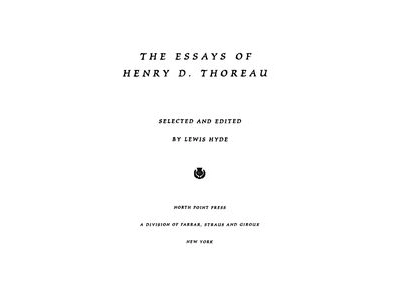The Essays of Henry D Thoreau Read Online
The Essays of Henry D. Thoreau

Table of Contents
Title Page
INTRODUCTION: - PROPHETIC EXCURSIONS
NATURAL HISTORY OF MASSACHUSETTS
A WINTER WALK
PARADISE (TO BE) REGAINED
KTAADN
CIVIL DISOBEDIENCE
WALKING
SLAVERY IN MASSACHUSETTS
LIFE WITHOUT PRINCIPLE
AUTUMNAL TINTS
THE PURPLE GRASSES
THE RED MAPLE
THE ELM
FALLEN LEAVES
THE SUGAR MAPLE
THE SCARLET OAK
THE SUCCESSION OF FOREST TREES
A PLEA FOR CAPTAIN JOHN BROWN
THE LAST DAYS OF JOHN BROWN
WILD APPLES
THE HISTORY OF THE APPLE TREE
THE WILD APPLE
THE CRAB
HOW THE WILD APPLE GROWS
THE FRUIT, AND ITS FLAVOR
THEIR BEAUTY
THE NAMING OF THEM
THE LAST GLEANING
THE “FROZEN-THAWED” APPLE
ACKNOWLEDGMENTS
A NOTE ON THE SELECTION
ANNOTATIONS
BIBLIOGRAPHY
INDEX
Notes
Copyright Page
PROPHETIC EXCURSIONS
LEWIS HYDE
I. A TALL WHITE PINE
When I was young and longed to write, I was much in love with Henry D. Thoreau. I loved the plain declarative sentences and flat statements of belief from which he built his work: “Surely joy is the condition of life.” “We must look a long time before we can see.” “What is time but the stuff delay is made of?” “The blue-bird carries the sky on his back.” “They are lovers of law and order who observe the law when the government breaks it.” “It is not indifferent to us which way we walk. There is a right way.”
I liked it that Thoreau sorted life into the sacred and the profane, the true and the trivial, the living and the dead. Take the opening paragraphs of his essay “Walking”:
I wish to speak a word for Nature, for absolute freedom and wildness, as contrasted with a freedom and culture merely civil,—to regard man as an inhabitant, or a part and parcel of Nature, rather than a member of society. I wish to make an extreme statement, if so I may make an emphatic one, for there are enough champions of civilization: the minister and the school committee and every one of you will take care of that.
I have met with but one or two persons in the course of my life who understood the art of Walking, that is, of taking walks,—who had a genius, so to speak, for sauntering, which word is beautifully derived “from idle people who roved about the country, in the Middle Ages, and asked charity, under pretense of going à la Sainte Terre,” to the Holy Land, till the children exclaimed, “There goes a Sainte-Terrer,” a Saunterer, a Holy-Lander. They who never go to the Holy Land in their walks, as they pretend, are indeed mere idlers and vagabonds; but they who do go there are saunterers in the good sense, such as I mean.
The man draws the line and makes a choice. The “merely civil,” “mere idlers”: lowlife surrounds us, but we needn’t be a part of it. That elevated tone I loved, and I loved the demands that followed on it:
We should go forth on the shortest walk … in the spirit of undying adventure, never to return,—prepared to send back our embalmed hearts only as relics to our desolate kingdoms. If you are ready to leave father and mother, and brother and sister, and wife and child and friends, and never see them again,—if you have paid your debts, and made your will, and settled all your affairs, and are a free man, then you are ready for a walk.
I was in my early twenties when I read these essays, and I longed for someone to tell me what to do. My life was not what I wanted. I had quit graduate school in a late-adolescent huff. I wished to be a writer, but I wasn’t a writer. The country was at war; my best friend in jail. I was stuck in a bad marriage, having neither the wisdom to improve it nor the courage to leave. I was terrified of death, convinced my heart might stop at any minute. I lay in bed unable to sleep, rebuilding in fantasy a stone wall I had once built in childhood.
And I loitered near the café tables where old men were saying, “I believe,” and “We must look,” and “There is a right way.” “Believe,” “must,” “is”: what simple, beautiful verbs! I wanted to talk like that.
I did not know it then, but the voice that attracted me to these essays is rightly called prophetic. We have a tradition of prophetic literature that goes back to the Old Testament, of course, and though it is hardly the modern style, prophetic poems, even prophetic novels, can sometimes still be found. Whitman has this voice: he invites us to feel we are among the immortals, large-mannered, spanning continents. As for novels, E. M. Forster once gave a lecture on prophetic fiction, and his examples were Dostoyevsky, Melville, Emily Brontë, and D. H. Lawrence. I would add Flannery O‘Connor: prophets offer revelation, and so did O’Connor; she designed her tales to induce in us that second sight by which we see the workings of an invisible world.
Poems and novels are not what concern me here, however. Here I want to offer a point of entry into Thoreau’s essays, and reflecting on how he pitches his voice—especially in “Walking”—seems a good way to start. Before I begin, I should say that by “prophetic” I do not mean “telling the future.” The prophetic voice has a relationship to time, but telling the future is the least of it. The prophet does not say that the price of oil will go up in October, or that a comet will strike the earth in twenty years.

1 comment